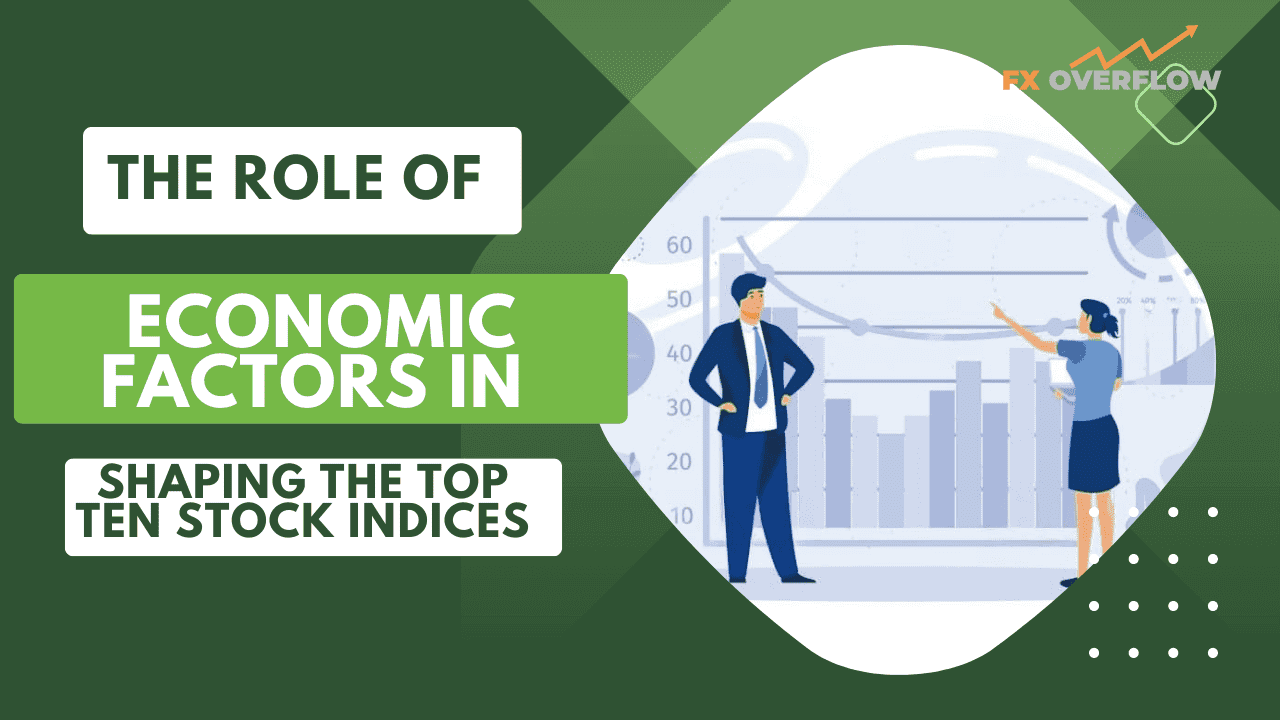Economic Indicators and Stock Indices: A Comprehensive Guide
In the world of finance and investment, stock indices play a crucial role in representing the overall performance of a specific stock market or a segment of it. Investors, analysts, and policymakers closely monitor these indices to gauge the health and direction of the economy. The movement of these indices is not random; it is heavily influenced by various economic factors that drive the financial markets.
Outline of the Article:
- Introduction
- Understanding Stock Indices
o Definition of Stock Indices
o Purpose and Significance
- Factors Influencing Stock Indices
o Economic Factors
o Political Factors
o Market Sentiment
o Technological Advancements
- The Role of Economic Factors in Shaping Top Stock Indices
o GDP Growth and Stock Indices
o Interest Rates and Stock Indices
o Inflation Rates and Stock Indices
o Unemployment Rates and Stock Indices
o Fiscal and Monetary Policies
o International Trade and Stock Indices
o Corporate Earnings and Stock Indices
o Consumer Confidence and Stock Indices
o Stock Market Speculation and Economic Factors
- Case Studies of Economic Factors Impacting Stock Indices
o Example 1: Impact of GDP Growth on Index Performance
o Example 2: Interest Rate Changes and Market Volatility
o Example 3: Inflation and Investor Behavior
- The Relationship Between Economic Factors and Stock Market Volatility
o Understanding Stock Market Volatility
o Correlation between Economic Indicators and Volatility
o Mitigating Volatility through Economic Policies
- The Global Perspective: Economic Factors and International Stock Indices
o Cross-Border Investments and Economic Factors
o Geopolitical Events and Global Indices
o Exchange Rates and International Markets
- Challenges and Risks Associated with Economic Factors
o Uncertainty and Economic Projections
o Impact of Unexpected Events on Stock Indices
o Balancing Economic Factors with Other Influences
- Strategies for Investors: Navigating Economic Factors
o Long-Term vs. Short-Term Investments
o Diversification and Risk Management
o Staying Informed about Economic Developments
- Footnote
- FAQs (Frequently Asked Questions)
Introduction
Stock indices play a vital role in the world of finance, serving as barometers for the overall health and performance of the stock market. They represent a basket of selected stocks from various industries, and their movements reflect the collective performance of these constituent companies. While stock indices are influenced by a variety of factors, economic factors hold a prominent position in shaping the top ten stock indices.

Understanding Stock Indices
· Definition of Stock Indices
A stock index is a statistical measure that tracks the performance of a specific section of the stock market. It comprises a diversified portfolio of stocks chosen to represent a particular market or sector. Popular examples include the S&P 500, Dow Jones Industrial Average, and NASDAQ Composite.
· Purpose and Significance
Stock indices are critical for investors, financial analysts, and policymakers. They offer valuable insights into market trends, investor sentiment, and the overall economic climate. Movements in stock indices can impact investor behavior and influence economic decisions.
Factors Influencing Stock Indices
Stock indices are influenced by a myriad of factors, ranging from economic to political and psychological. Understanding these influences helps in comprehending market behavior and anticipating future trends.
· Economic Factors
Economic factors, in particular, have a profound impact on stock indices. Various key indicators act as fundamental determinants of market movements:
· Political Factors
Political stability, government policies, and geopolitical events can significantly impact investor confidence and, consequently, stock indices.
· Market Sentiment
Investor emotions, perceptions, and expectations can lead to market fluctuations and affect stock indices.
· Technological Advancements
Advancements in technology and their disruptive impact on industries can influence the performance of specific stocks and, consequently, stock indices.
The Role of Economic Factors in Shaping Top Stock Indices
Economic factors are major driving forces behind the movements of the top ten stock indices. Let's explore the various economic factors that play a pivotal role:
· GDP Growth and Stock Indices
Gross Domestic Product (GDP) growth is a key indicator of a country's economic health. As the economy expands, company revenues and profits tend to rise, leading to an overall bullish sentiment in the stock market. Conversely, sluggish GDP growth can result in bearish market conditions.
· Interest Rates and Stock Indices
Central banks' decisions on interest rates have a significant impact on the stock market. Lower interest rates encourage borrowing and spending, stimulating economic activity and boosting stock prices. On the other hand, higher interest rates can lead to reduced borrowing and spending, potentially dampening stock market performance.
· Inflation Rates and Stock Indices
Inflation refers to the increase in the general price level of goods and services. Moderate inflation can be conducive to economic growth, but high inflation erodes purchasing power and can negatively affect consumer spending, leading to a bearish market sentiment.
· Unemployment Rates and Stock Indices
Unemployment rates influence consumer spending, corporate profitability, and overall economic growth. High unemployment rates can lead to reduced consumer confidence and lower corporate earnings, impacting stock market performance.
· Fiscal and Monetary Policies
Government fiscal policies, such as taxation and spending, and central banks' monetary policies, including money supply regulation, influence economic activities and financial markets.
· International Trade and Stock Indices
Global economic relations, trade agreements, and tariffs can impact the performance of multinational companies, directly affecting stock indices with significant international exposure.
· Corporate Earnings and Stock Indices
The financial performance of individual companies, reflected in their earnings reports, can have a substantial effect on the stock indices they are a part of.
· Consumer Confidence and Stock Indices
· Consumer sentiment and confidence levels influence spending patterns, which, in turn, affect company revenues and stock prices.
· Stock Market Speculation and Economic Factors
Investor speculation based on economic indicators can lead to sudden and significant movements in stock indices.
Case Studies of Economic Factors Impacting Stock Indices
To better understand the influence of economic factors on stock indices, let's examine some case studies:
· Example 1: Impact of GDP Growth on Index Performance
In a booming economy with robust GDP growth, stock indices like the S&P 500 tend to reach record highs as companies experience increased demand and revenue.
· Example 2: Interest Rate Changes and Market Volatility
A sudden increase in interest rates by the Federal Reserve can create market volatility, causing fluctuations in major indices like the Dow Jones Industrial Average.
· Example 3: Inflation and Investor Behavior
High inflation rates can lead investors to seek inflation-protected assets, impacting the performance of stock indices.
The Relationship Between Economic Factors and Stock Market Volatility
· Understanding Stock Market Volatility
Stock market volatility refers to the rapid and significant price fluctuations of stocks within a short period. It can be influenced by various factors, including economic indicators.
· Correlation between Economic Indicators and Volatility
Certain economic indicators, such as unemployment rates or GDP growth, can trigger volatility in the stock market as investors respond to changing economic conditions.
· Mitigating Volatility through Economic Policies
Governments and central banks implement measures to stabilize markets during periods of high volatility.
The Global Perspective: Economic Factors and International Stock Indices
· Cross-Border Investments and Economic Factors
Economic developments in one country can impact international stock indices through cross-border investments.
· Geopolitical Events and Global Indices
Geopolitical events, such as conflicts or trade disputes, can cause fluctuations in global stock indices.
· Exchange Rates and International Markets
Fluctuations in exchange rates influence the performance of international stock indices.
Challenges and Risks Associated with Economic Factors
· Uncertainty and Economic Projections
Forecasting economic developments is complex, and unexpected outcomes can affect stock indices.
· Impact of Unexpected Events on Stock Indices
Natural disasters, political upheavals, or economic crises can cause sudden shifts in stock indices.
· Balancing Economic Factors with Other Influences
Multiple factors interact to influence stock market movements, requiring a comprehensive analysis approach.
Strategies for Investors: Navigating Economic Factors
· Long-Term vs. Short-Term Investments
Investors adopt different strategies based on their investment goals and the economic outlook.
· Diversification and Risk Management
Diversifying investments across various asset classes helps mitigate risk associated with economic fluctuations.
· Staying Informed about Economic Developments
Keeping abreast of economic news and indicators is essential for making informed investment decisions.
Footnote
Economic factors play a critical role in shaping the top ten stock indices. Understanding these factors and their impact on the market is vital for investors seeking to make informed decisions. As economies evolve and global dynamics shift, staying vigilant and adaptable is key to navigating the complex interplay between economic factors and the stock market.
FAQs (Frequently Asked Questions)
- How do economic factors influence stock indices?
Economic factors, such as GDP growth, interest rates, inflation, and unemployment, directly affect corporate performance and investor sentiment, leading to fluctuations in stock indices.
- What role do central banks play in shaping stock indices?
Central banks' decisions on monetary policy, particularly interest rates, can have a significant impact on stock market performance and, consequently, stock indices.
- How can investors mitigate risks associated with economic factors?
Investors can diversify their portfolios, adopt long-term investment strategies, and stay informed about economic developments to mitigate risks in a dynamic market environment.
- Why is stock market volatility linked to economic indicators?
Economic indicators provide insights into the overall health of the economy, affecting investor behavior and, in turn, influencing stock market volatility.
- What is the significance of international economic relations in shaping stock indices?
Global economic relations and cross-border investments can impact the performance of international stock indices, making them susceptible to economic developments in other countries.











Discussion